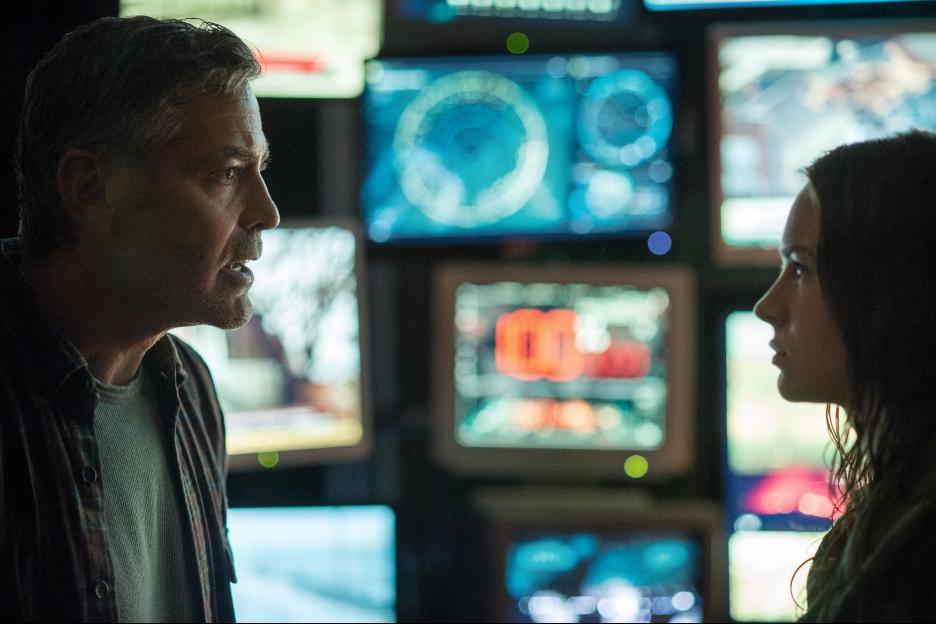The Future Is As Clear As Mud In Disney’s Latest Theme Park Adaptation
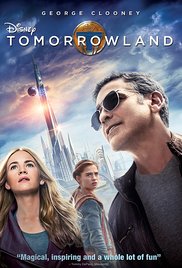 ERIK YATES: In Brad Bird’s latest adventure film for Disney, we are introduced to a teenage girl named Casey (Britt Robertson – Dan in Real Life, The Longest Ride) who is a dreamer, and an optimist. She also is a criminal on the side, trying to keep a NASA launch pad from being torn-down in a world that no longer looks for adventure in the stars. Her father Eddie (Tim McGraw of The Blind Side), a NASA engineer tells her a story. The story is about two wolves. One wolf is full of darkness, and the other is full of light. And as they battle, the one who wins out, is the one you feed.
ERIK YATES: In Brad Bird’s latest adventure film for Disney, we are introduced to a teenage girl named Casey (Britt Robertson – Dan in Real Life, The Longest Ride) who is a dreamer, and an optimist. She also is a criminal on the side, trying to keep a NASA launch pad from being torn-down in a world that no longer looks for adventure in the stars. Her father Eddie (Tim McGraw of The Blind Side), a NASA engineer tells her a story. The story is about two wolves. One wolf is full of darkness, and the other is full of light. And as they battle, the one who wins out, is the one you feed.
While this is definitely a metaphor for the story and how it will play out, it can also be an apt depiction of what is right with this story, and what is not. When Brad Bird is feeding the wolf full of light, we get a fantastical adventure that recalls the Disney stories of old with a childlike gaze to what is possible and an innocent, and refreshingly naivety of the world that only sees the possibilities.
When he feeds the other wolf, the story drags and gets tangled up in cynicism, and bloated, over-violent action scenes for the younger crowd that Disney is aiming for. George Clooney’s character of Frank Walker is full of such cynicism. Even though his is a typical character arc of a character that has lost his way from the enthusiasm he had as a boy, and only needs to be reminded of what his former self used to be like, it is his character that the feeds this wolf of darkness the most. This balancing act of darkness and light is a delicate one, much like the one between story and spectacle. Brad Bird is a man up for the job of giving us both, but sometimes, I wondered if he was going to fall off the high wire trying to do so.

George Clooney in TOMORROWLAND.
JIM TUDOR: There’s no way around it, Tomorrowland is a disappointment. This is particularly true, considering its pedigree. This is the first misstep of Bird’s career. The man won an Academy Award for The Incredibles, which, in my opinion, was the single best film of the previous decade. His live action debut, Mission: Impossible – Ghost Protocol had box office success, and is now often considered that franchise’s high point. In a late 2015 interview, Bird all but said that he turned down Star Wars Episode 7 since this film, Tomorrowland, was so close to becoming a reality. Indeed, there was bright hope for Tomorrowland. But like the reality of the actual Tomorrowland depicted in the film, the whole venture slips back and forth between golden wheat fields and blue skies to dark muck and running into things.
The wolf analogy is a very good one, Erik. In a movie overstuffed with statements, speeches, and sociological monologues, that simple notion is one of the movie’s clearest and more memorable pronouncements. But yes, yes, yes – the film itself is battling those very same wild polarities. And yet, neither the dark pessimism or the bright optism ever really take hold – it’s like both wolves are caged the entire time, anyhow.
There’s no question that the point of Tomorrowland is to be that movie that guides us as viewers beyond our ingrained cynicism and active darkness to re-embrace the kind of wide-eyed futurism that Walt Disney himself instilled in his Tomorrowland theme park attractions. For Walt, he was serious in his intentions to info-tain and inspire hope for the possibilities of tomorrow. But in a world of no more space travel, eco-disaster, and the perpetual threat of mass destruction, his vision now feels like the novelty bit of retro-futurism that it’s become. When Brad Bird, along with screenwriter Damon Lindelof (of LOST fame) took on the task of smartly reconsiling these massively opposing notions within the confines of a PG rated Disney summer tent pole based on a theme park element, they bit off more than they could chew.
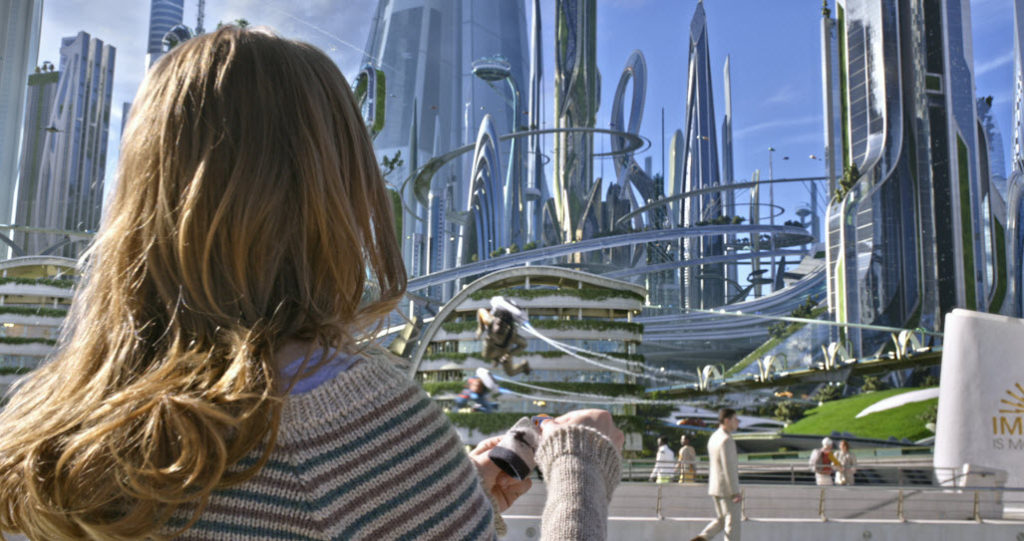
ERIK YATES: Speaking of The Incredibles, the set up for Tomorrowland is very much like Bird’s previous masterpiece. It starts off with an interview of sorts, a hopeful start, a place where it all went wrong and descends into what it now is before trying to get back to the former glory. But the cynicism is too much to overcome. Clooney broods around like a cranky hermit for most of the film, and because he is always charismatic, the film follows his lead, takes his character’s tone and holds the hopeful, wide-eyed possibilities at bay. Hugh Laurie’s (House) character of Nix, also aids in this endeavor, though less so based on his minimal screen time.
The thing about Walt Disney is that in addition to being a great salesman of his brand (the films, the theme park, the image, etc.), I get the feeling that he truly believed in the type of hope he was trying to inspire. And when you believe in it truly, it can be felt at every level. Disney films, including (and maybe especially) the animated ones, weren’t afraid of showing the darkness that is at the door. How many characters in the Disney cannon have lost loved ones, or had their dreams unrealized? Yet, even in the midst of such tragedy, the characters held on the notion that good was still possible in spite of the situational evidence around us. They truly believed! And it was contagious, without at all whitewashing the darkness that exists in life away.
This film however doesn’t truly believe in the ideals they are claiming to aspire to. They simply hope really hard….and I think they believe that maybe optimism for its own sake will win out, but they aren’t sure it will. And so Tomorrowland blends into the landscape of all of the other dystopian films bombarding our culture with the message that goodness, hopefulness, and aspirations, while an ideal aspiration, don’t always win in the end. In short, they’re preaching the wide-eyed futurism you mentioned, but they’re still feeding the wolf of cynicism and darkness. And like the story we were told in the beginning, the wolf you feed is the one that prevails.
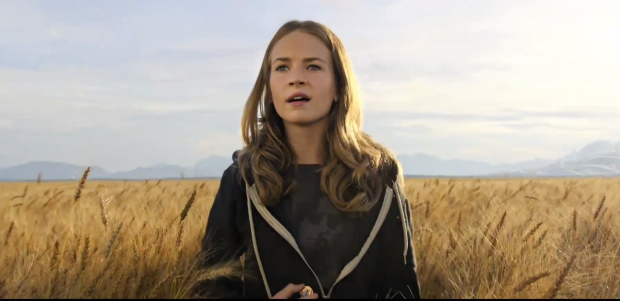
Britt Robertson in TOMORROWLAND.
JIM TUDOR: True. And Bird and Lindelof seem intent on feeding their wolves with a whole lot of yakity-yak. For a film geared primarily at ten year olds, it’s far too heady, and far too talky for it’s own good. There are some very good, very true ideas kicking around here, but every time a character launches into an explanatory bit of dialogue, the speech runs three times as long as it should, with the sociological/multi-dimensional/decades-spanning intrique/cynicism-versus-optimism themes prattled on about ad nauseum.
Tomorrowland should’ve been my nine year old gadget-fascinated son’s favorite movie of the year. But when it ended, he could only shrug it off. And this is a kid who’s yet to dislike a whole lot of movies. From his perspective, Tomorrowland is long, talky, and a little freaky; full of angry grown-ups scowling about how bad the world is while a teen girl has an adventure that’s impossible to understand. It’s the very movie that shows Space Mountain, but no one ever rides it.
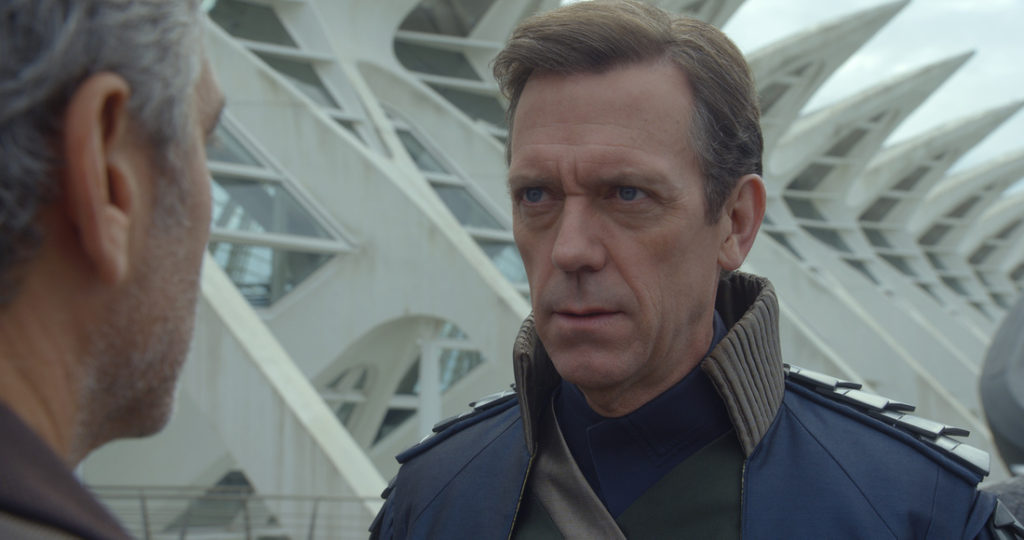
Bad House.
As for me, I must say I enjoyed its crooked, overreaching ways while I was watching it. There’s not one but two Willy Wonka-esque sequences where characters are strapped into a ride that becomes a psychedelic trippy trip to elsewhere, realized via warped noises, streaky colors, and blurring. The production design of both Tomorrowland itself (like the theme park but much larger) and Clooney’s character’s tricked-out house are impressive. And the little girl playing the benevolent protagonist with a few secrets of her own (Raffey Cassidy) is a freakish dead ringer for a young Audrey Hepburn, if Audrey Hepburn could take a hit from a speeding vehicle.
Additionally, although Britt Roberetson’s performance is a little flat, it’s nice to have a female protagonist in what appears to be a very boy-skewing adventure film. Storywise, gender has absolutely zero bearing on her character’s history and arc. I suppose from a gender politics standpoint, this is a good thing. Yet, it also means the character is all more generic, all the more bland. And a well-meaning young genius criminal such as this should not be bland.
At one point, our heroine visits a store that can only be describes as the geekiest movie musuem set to film since Joe Dante showed us Area 52 in Looney Tunes: Back in Action. Look closely and you’ll see that the place is actually a Brad Bird/Damon Lindelof career archive.
There are burst of fun, but that feeling doesn’t last through the closing credits. The movie shoots over the heads of kids, and drones on to adults. Yes, it’s a rare opportunity to see George Clooney zip around in a jet pack in a Disney movie, but the Erik’s earlier point about his cynical performance dominating the film’s tone is right on.
At 130 minutes, Tomorrowland is so longish that you may feel like it’s tomorrow when you leave the theater. Based upon both Bird, Lindelof, and story/producer Jeff Jensen’s other work, I had a lot of hope for this vision of a bright future. But what we get is an uneasy, LOST-lite, lecture on not losing hope. (At our screening, they actually trotted out a local technology professor to lecture the audience about this very thing beforehand. Will the redundancy of it all threaten the possibility of future university professors giving lectures before family films??) Tomorrowland is one of the biggest moviegoing disappointments of the year. It’s a little jarring and odd when one goes in expecting a Roddenberry-esque/Jetsons Disney spectacle, but instead gets a Willy Wonka/Time Bandits misfire. What were the filmmakers thinking when they went to feed their wolves? Tomorrowland never knows.
